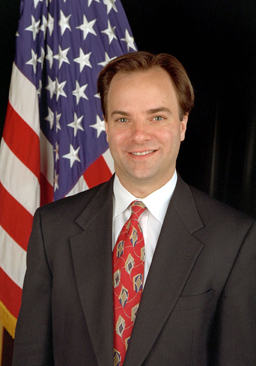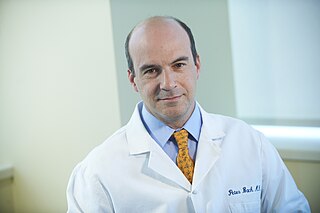
Mark Barr McClellan is the director of the Robert J Margolis Center for Health Policy and the Margolis Professor of Business, Medicine and Health Policy at Duke University. Formerly, he was a senior fellow and director of the Health Care Innovation and Value Initiative at the Engelberg Center for Health Care Reform at The Brookings Institution, in Washington, D.C. McClellan served as commissioner of the United States Food and Drug Administration under President George W. Bush from 2002 through 2004, and subsequently as administrator of the Centers for Medicare and Medicaid Services from 2004 through 2006.
The Joint Commission is a United States-based nonprofit tax-exempt 501(c) organization that accredits more than 22,000 US health care organizations and programs. The international branch accredits medical services from around the world.
In the healthcare industry, pay for performance (P4P), also known as "value-based purchasing", is a payment model that offers financial incentives to physicians, hospitals, medical groups, and other healthcare providers for meeting certain performance measures. Clinical outcomes, such as longer survival, are difficult to measure, so pay for performance systems usually evaluate process quality and efficiency, such as measuring blood pressure, lowering blood pressure, or counseling patients to stop smoking. This model also penalizes health care providers for poor outcomes, medical errors, or increased costs. Integrated delivery systems where insurers and providers share in the cost are intended to help align incentives for value-based care.
Fee-for-service (FFS) is a payment model where services are unbundled and paid for separately.
Patient safety is a discipline that emphasizes safety in health care through the prevention, reduction, reporting and analysis of error and other types of unnecessary harm that often lead to adverse patient events. The magnitude of avoidable adverse events, often known as patient safety incidents, experienced by patients was not well known until the 1990s, when multiple countries reported significant numbers of patients harmed and killed by medical errors. Recognizing that healthcare errors impact 1 in every 10 patients around the world, the World Health Organization (WHO) calls patient safety an endemic concern. Indeed, patient safety has emerged as a distinct healthcare discipline supported by an immature yet developing scientific framework. There is a significant transdisciplinary body of theoretical and research literature that informs the science of patient safety with mobile health apps being a growing area of research.
Hospital accreditation has been defined as “A self-assessment and external peer assessment process used by health care organizations to accurately assess their level of performance in relation to established standards and to implement ways to continuously improve”. Critically, accreditation is not just about standard-setting: there are analytical, counseling and self-improvement dimensions to the process. There are parallel issues in evidence-based medicine, quality assurance and medical ethics, and the reduction of medical error is a key role of the accreditation process. Hospital accreditation is therefore one component in the maintenance of patient safety. However, there is limited and contested evidence supporting the effectiveness of accreditation programs.
John E. "Jack" Wennberg was an American healthcare researcher who was a pioneer of unwarranted variation in the healthcare industry. In four decades of work, Wennberg has documented the geographic variation in the healthcare that patients receive in the United States. In 1988, he founded the Center for the Evaluative Clinical Sciences at Dartmouth Medical School to address that unwarranted variation in healthcare.
Healthcare reform in the United States has had a long history. Reforms have often been proposed but have rarely been accomplished. In 2010, landmark reform was passed through two federal statutes: the Patient Protection and Affordable Care Act (PPACA), signed March 23, 2010, and the Health Care and Education Reconciliation Act of 2010, which amended the PPACA and became law on March 30, 2010.
Healthcare rationing in the United States exists in various forms. Access to private health insurance is rationed on price and ability to pay. Those unable to afford a health insurance policy are unable to acquire a private plan except by employer-provided and other job-attached coverage, and insurance companies sometimes pre-screen applicants for pre-existing medical conditions. Applicants with such conditions may be declined cover or pay higher premiums and/or have extra conditions imposed such as a waiting period.
Bundled payment is the reimbursement of health care providers "on the basis of expected costs for clinically-defined episodes of care." It has been described as "a middle ground" between fee-for-service reimbursement and capitation, given that risk is shared between payer and provider. Bundled payments have been proposed in the health care reform debate in the United States as a strategy for reducing health care costs, especially during the Obama administration (2009–2016). Commercial payers have shown interest in bundled payments in order to reduce costs. In 2012, it was estimated that approximately one-third of the United States healthcare reimbursement used bundled methodology.

Healthcare in the United States is largely provided by private sector healthcare facilities, and paid for by a combination of public programs, private insurance, and out-of-pocket payments. The U.S. is the only developed country without a system of universal healthcare, and a significant proportion of its population lacks health insurance. The United States spends more on healthcare than any other country, both in absolute terms and as a percentage of GDP; however, this expenditure does not necessarily translate into better overall health outcomes compared to other developed nations. Coverage varies widely across the population, with certain groups, such as the elderly and low-income individuals, receiving more comprehensive care through government programs such as Medicaid and Medicare.
Glenn Laffel is a physician and health IT entrepreneur. He formerly served as the Senior Vice President of Clinical Affairs for Practice Fusion, a San Francisco-based company that offers a Web-based Electronic Health Record (EHR) for free to physicians.
An accountable care organization (ACO) is a healthcare organization that ties provider reimbursements to quality metrics and reductions in the cost of care. ACOs in the United States are formed from a group of coordinated health-care practitioners. They use alternative payment models, normally, capitation. The organization is accountable to patients and third-party payers for the quality, appropriateness and efficiency of the health care provided. According to the Centers for Medicare and Medicaid Services, an ACO is "an organization of health care practitioners that agrees to be accountable for the quality, cost, and overall care of Medicare beneficiaries who are enrolled in the traditional fee-for-service program who are assigned to it".
Sachin H. Jain is an American physician who held leadership positions in the Center for Medicare and Medicaid Services (CMS) and the Office of the National Coordinator for Health Information Technology (ONC). From 2015 to 2020, he served as president and chief executive officer of the CareMore Health System. In June 2020, it was announced that he would join the SCAN Group and Health Plan as its new president and CEO. He is also adjunct professor of medicine at the Stanford University School of Medicine and a Contributor at Forbes. In 2018, he was named one of American healthcare's most 100 most influential leaders by Modern Healthcare magazine (#36).
Unnecessary health care is health care provided with a higher volume or cost than is appropriate. In the United States, where health care costs are the highest as a percentage of GDP, overuse was the predominant factor in its expense, accounting for about a third of its health care spending in 2012.

Peter B. Bach is a physician and writer in New York City. He is the Chief Medical Officer of DELFI Diagnostics and was previously an attending and researcher at Memorial Sloan-Kettering Cancer Center where he was the Director of the Center for Health Policy and Outcomes. His research focuses on healthcare policy, particularly as it relates to Medicare, racial disparities in cancer care quality, and lung cancer. Along with his scientific writings he is a frequent contributor to The New York Times and other newspapers.
Health care quality is a level of value provided by any health care resource, as determined by some measurement. As with quality in other fields, it is an assessment of whether something is good enough and whether it is suitable for its purpose. The goal of health care is to provide medical resources of high quality to all who need them; that is, to ensure good quality of life, cure illnesses when possible, to extend life expectancy, and so on. Researchers use a variety of quality measures to attempt to determine health care quality, including counts of a therapy's reduction or lessening of diseases identified by medical diagnosis, a decrease in the number of risk factors which people have following preventive care, or a survey of health indicators in a population who are accessing certain kinds of care.
Steven Pearson is an American physician, bioethicist, and the Founder and President of the non-profit health policy and comparative effectiveness research organization Institute for Clinical and Economic Review in Boston, MA. He conducts research on cost-effectiveness analysis and healthcare technology assessment. He is also a lecturer in Harvard's Department of Population Medicine and a member of the National Institutes of Health (NIH) Comparative Effectiveness Research Steering Committee.
Nancy Keating is an American physician who works at the Brigham and Women's Hospital and is a professor at Harvard Medical School. Her research considers the factors that influence quality care for people suffering from cancer.

Kaveh G. Shojania is a Canadian doctor, academic and an author. He is the vice chair of quality & innovation in the department of medicine at the University of Toronto as well as staff physician at the Sunnybrook Health Sciences Centre.





